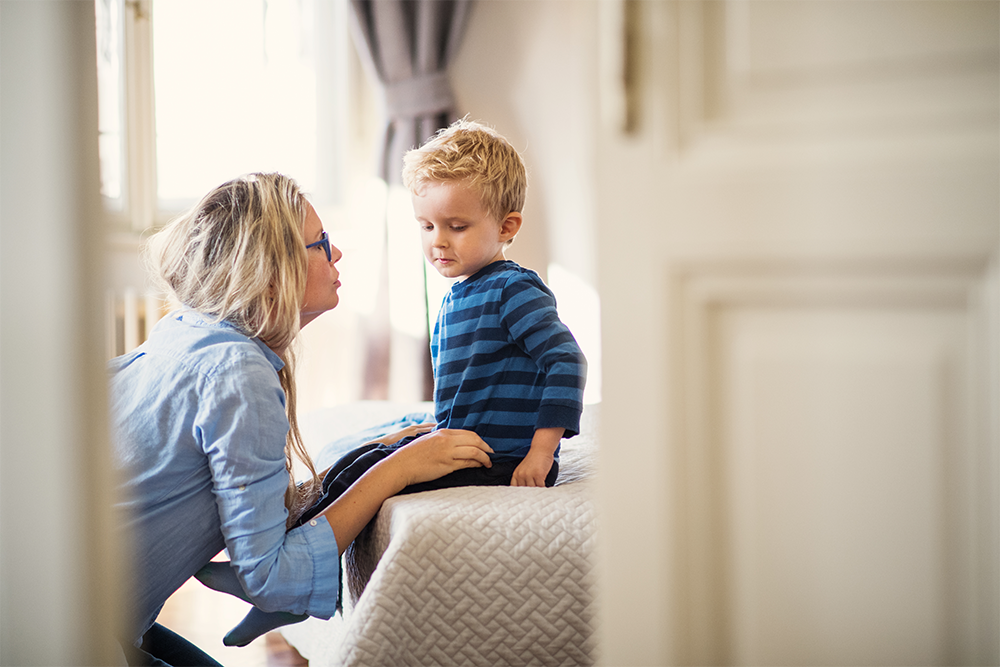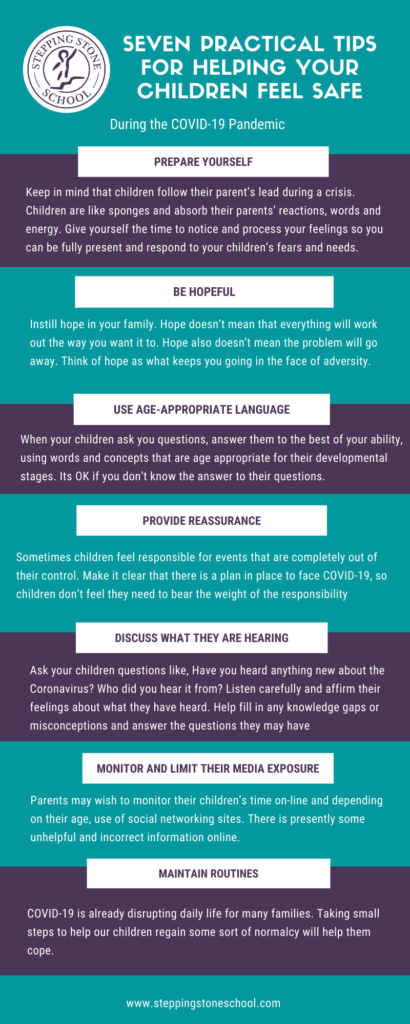Seven Practical Tips for Helping Your Children Feel Safe During the COVID-19 Pandemic
As public conversation and news reports around COVID-19 increase, your children may worry about themselves, their friends and their family. Parents and family members can play an important role in easing your children’s anxiety and fears.
As a parent, you have likely been wondering about how your children may be feeling about the virus. Between the news, social media and other children at school, it is likely your child already has heard about the virus and may feel unsafe or scared.

Prepare Yourself
Keep in mind that children follow their parent’s lead during a crisis. Children are like sponges and absorb their parents’ reactions, words and energy. If you are feeling anxious about having this conversation with your children, that is completely natural. You are having your own feelings about what you and your family may be facing. You may also be worried about saying or doing the wrong thing. Remind yourself that you are there to help your children, not the other way around. Give yourself the time to notice and process your feelings so you can be fully present and respond to your children’s fears and needs. Prepare for your conversation in advance by going to the CDC website and reading their descriptions and advice provided in their articles and Q&As. https://www.cdc.gov/coronavirus/2019-ncov/community/schools-childcare/talking-with-children.html
Be Hopeful
Instill hope in your family. Hope doesn’t mean that everything will work out the way you want it to. Hope also doesn’t mean the problem will go away. Think of hope as what keeps you going in the face of adversity. During your conversation, embrace what has helped your family during other times of adversity.
Use Age-Appropriate Language
Recognize your child’s developmental ability to understand the situation. You should start by asking them what they know about the virus. Based on their ages, some of your children may know more than others. This is a good starting point. When your children ask you questions, answer them to the best of your ability, using words and concepts that are age appropriate for their developmental stages. Its OK if you don’t know the answer to their questions. You can use this as an opportunity to model how to look up information on the Internet. Also explain that there is reliable information like the CDC, and some information that may be suspect. Be authentic with your children, but remember to talk to them as children, not adults.
Provide Reassurance
Sometimes children feel responsible for events that are completely out of their control. Make it clear that there is a plan in place to face COVID-19, so children don’t feel they need to bear the weight of the responsibility. When children are reassured that adults are taking control of a situation, you provide permission for your children to be children.
Discuss What They are Hearing
Children often pick up more than we realize. Whether it’s in the car, at the dinner table or while playing a board game, ask your children questions like:
- Have you heard anything new about the Coronavirus?
- Who did you hear it from?
Listen carefully and affirm their feelings about what they have heard. Help fill in any knowledge gaps or misconceptions and answer the questions they may have.
Monitor and Limit Their Media Exposure
Parents may wish to monitor their children’s time on-line and depending on their age, use of social networking sites. There is presently some unhelpful and incorrect information online. Take steps to check what your children are reading, hearing and watching. This may also include parents’ limiting their own exposure to anxiety-provoking information.
Maintain Routines
COVID-19 is already disrupting daily life for many families. Taking small steps to help our children regain some sort of normalcy will help them cope. This means trying to maintain some structure in our interactions. Familiar activities, schedules, and routines help your children feel secure.
For more information about our COVID-19 response click here!
